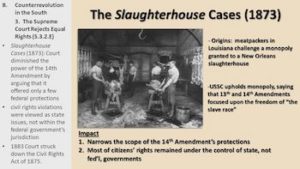
On this date in 1873, the Supreme Court decided the Slaughterhouse cases. These profoundly affected former black slaves and the Fourteenth Amendment of the American Constitution.
In 1869, the Louisiana legislature granted a 25-year monopoly on a slaughterhouse in New Orleans to protect the people's health. A group of white butchers sued, claiming that the law violated the Fourteenth Amendment, which provided that states could not deprive any person of life, liberty, or property without due process of law. U.S. Supreme Court Justice Samuel F. Miller, in a 5-4 decision, held that the Fourteenth Amendment protected only the ex-slaves, not butchers, and that it affected only those rights related to national citizenship, not the right of the states to exercise their regulatory powers.
Yet the dissent by Justice Stephen J. Field influenced how future justices would view the amendment. A Lincoln appointee, Field was a Democrat who opposed Reconstruction. He argued that the amendment gave the federal government broader powers than Miller's majority opinion claimed. Field did not want the federal government to protect Black civil rights. He wanted the federal government to stop regulating economic interests like railroads. Field's opinion shaped the conservative judicial views of the Constitution into the twentieth century. It gave the Fourteenth Amendment a meaning different from what its authors intended.
Historic U.S. Cases 1690-1993:
An Encyclopedia New York
Copyright 1992 Garland Publishing, New York
ISBN 0-8240-4430-4